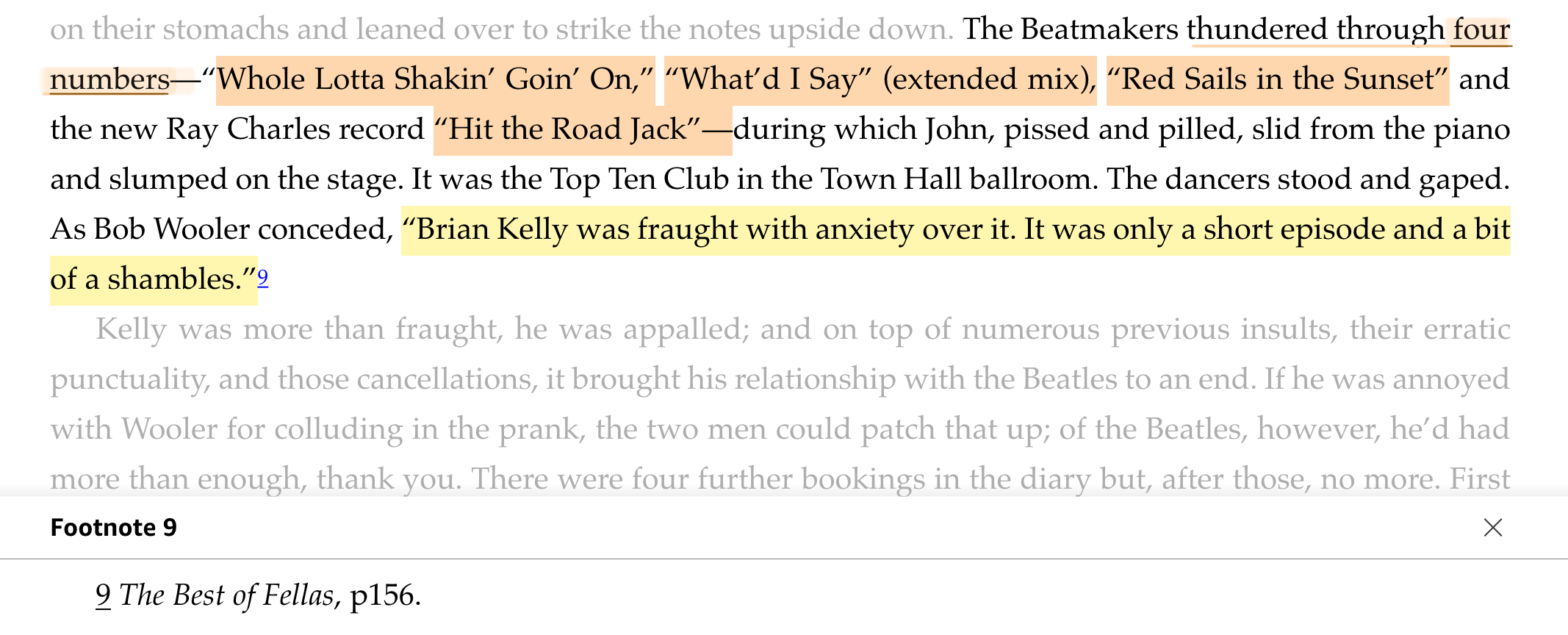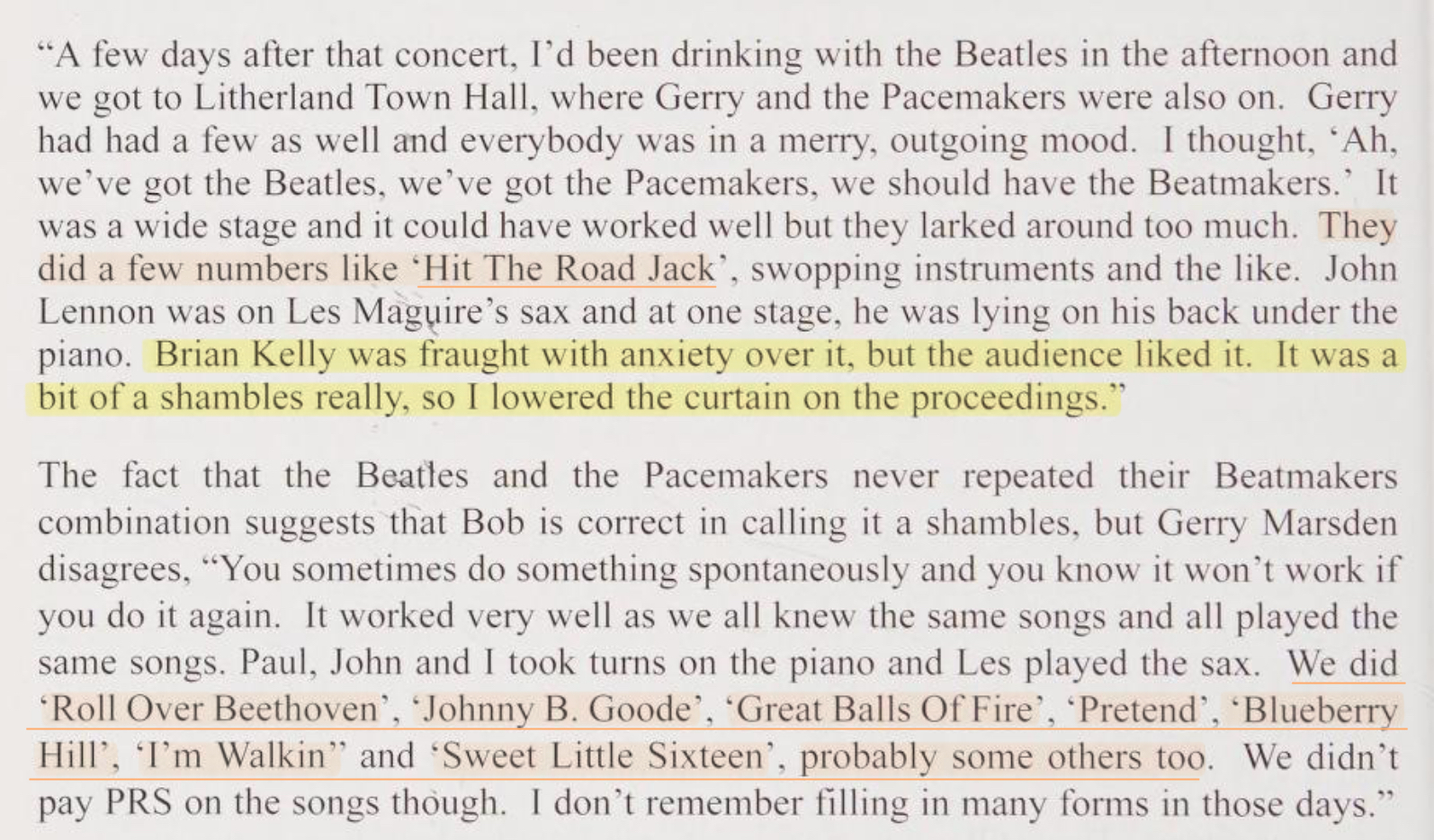Although I’ve come to a place where I’m more surprised to find a Lewisohn quote that turns out to be accurate than I am one that’s butchered, I have tended to believe that he is trustworthy on things like dates and songs performed. I’ve felt like that’s probably his anchor, and that he shapes the rest of his narrative around that.
But perhaps the habit of taking license cannot help but spread into other areas, because I am discovering that neither dates nor song lists turn out to be sacred with Mark Lewisohn.
As far as dates, that is part of a bigger piece that has been tangling me up for a few weeks, but his version of “the Beatmakers” performance shows that Mark Lewisohn will write what he wants, and that he has zero compunction in changing history to suit himself, regardless of subject.
In Chapter 22: “Right then, Brian — Manage Us,” a primary theme is that every promoter was done with the Beatles when Brian Epstein came along. Brian Kelly, especially, is given the role of being fed up with them, and Lewisohn uses “the Beatmakers” performance—Gerry and the Pacemakers and the Beatles going on stage together—as an example of how bad everything was just before Brian stepped in. (I do believe that Brian was a godsend, but that doesn’t mean that Lewisohn’s narrative is supported in every area, and in some places he stretches a lot more than in others. This is definitely one of those areas.)
Here’s the story: before going to the Litherland Town Hall performance, Bob Wooler had been drinking, maybe with the Beatles, and in Lewisohn’s version, Gerry seeing that they were all drunk sent “Gerry Marsden scuttling to the pub around the corner.” Every telling I’ve seen, one way or another, is in agreement that Gerry Marsden as well as Wooler had been drinking, and that the Pacemakers and the Beatles all played together with Wooler introducing them as “the Beatmakers.”
Along with the chance to tell a riotously colorful story—one that in Lewisohn’s telling goes much farther than any of the source materials I’ve found—the main point of the tale is for Wooler to give us the climax of the—(all unsourced, other than this single, butchered Wooler quote)—frustration Lewisohn tells us promoter Brian Kelly was feeling: “Brian Kelly was fraught with anxiety over it. It was only a short episode and a bit of a shambles.”
The quote by Wooler that Lewisohn uses to try to prove his point, and the one and only reference he gives to support any of his “Brian Kelly fed up/Epstein must save Beatles” narrative is a modification of one of those Lewisohn monsters I call a “donut.” (There’s a hole in the middle. However in this case, as in many others, he also adds words that were never spoken.)
The actual Wooler Quote:
“Brian Kelly was fraught with anxiety over it, but the audience liked it. It was a bit of a shambles really, so I lowered the curtain on the proceedings.”
Lewisohn’s rewrite:
“Brian Kelly was fraught with anxiety over it. It was only a short episode and a bit of a shambles.”
It’s very easy to get sucked into the question of why Mark Lewisohn adds certain lines. Sometimes it’s obvious: they sound good. Like the final line of Tune In where it’s pretty obvious why he inserted his own words in place of John Lennon’s, because how are you going to end a book with, “—but you play me those tracks and I want to remake every damn one of them”? If quotes were as malleable as Lewisohn would like and no one had to be hampered by sticking to actual words spoken by the actual person quoted, it’s easy to see that “it was just a matter of time before everybody else caught on” is a much better choice. But why add, “It was only a short episode” here? Of course I can’t be sure. Perhaps because Lewisohn is going to tell us they only sang four songs, or—probably more likely—Lewisohn has decided to add a line and alter the set list to emphasize how bad the performance was. That’s why Wooler “lowered the curtain on the proceedings” so quickly, you see. And who was doing the singing in this shambolic performance? Lewisohn tells us—through his altered set list—that it was Paul, of course. In his telling, Gerry Marsden sings the first song and then it’s Paul, then Paul—extended version—and then Paul. Then finally, it’s curtains on this Paul shambles. That’s also why it was important to remove “but the audience liked it.” That doesn’t fit Lewisohn’s [re]framing.
And while I am very interested in what Lewisohn is using for his Brian-Epstein-saved-the-Beatles-but-Paul-tried-to-thwart-him narrative, I felt the need to pause to look at Lewisohn’s alterations to this performance. As I said at the start of this, I have tended to expect some degree of reliability on details like this from Mark Lewisohn. Considering what else I’ve seen from him, I am surprised at my enduring credulity, but I had figured there were constants that he stuck to, and that he then distorted his narrative around those hard, cold, reliable facts. In the last week, however, I have discovered that he is more than willing to move dates around, and with this revelation, the last veil has dropped. I see his commitment to altering anything and everything in what—at this point—I can only guess is a seething resentment of Paul McCartney, and believe it or not I am almost impressed by it.
Let us deal with the songs.


Mark Lewisohn says they “thundered through four numbers”—
The Beatmakers thundered through four numbers—”Whole Lotta Shakin’ Goin’ On,” “What’d I Say” (extended mix), “Red Sails in the Sunset” and the new Ray Charles record “Hit the Road Jack”—during which John, pissed and pilled, slid from the piano and slumped on the stage.
‘Tune In,’ Lewisohn – Chapter 22 (Emphasis mine.)
Sticking to the songs, the page referenced in the footnote first quotes Bob Wooler:
“They did a few numbers like ‘Hit The Road Jack’, swopping instruments and the like.”
Cited source: The Best of Fellas’ – Bob Wooler quote (Emphasis mine)
Then the next paragraph quotes Gerry Marsden, and I’m going to add boldface to the songs he says they played:
“It worked very well as we all knew the same songs and all played the same songs. Paul, John and I took turns on the piano and Les played the sax. We did ‘Roll Over Beethoven’, ‘Johnny B. Goode’, ‘Great Balls Of Fire’, ‘Pretend’, ‘Blueberry Hill’, ‘I’m Walkin’’ and ‘Sweet Little Sixteen‘, probably some others too.”
‘The Best of Fellas’ – Gerry Marsden quote – (Emphasis mine)
So, either they performed exactly four numbers, including an “extended mix” of Paul wailing ‘What’d I Say,’ —or— they performed at least eight numbers and “probably some others, too.”
“The Best of Fellas” version from Bob Wooler and Gerry Marsden that is cited makes sense in ways that Lewisohn’s rewriting doesn’t. Marsden begins by saying that they all knew the same numbers, and moreover Lewisohn is telling us that Paul took over the mic for three out of four numbers, and went so far in his spotlight-hogging selfishness as to sing an “extended version” of ‘What’d I Say.’ It’s a particularly egregious “if you know, you know” insertion that conjures up a very damning image of Paul in this otherwise “mutual mood of cooperativeness.” But not only is Lewisohn’s song list not supported, if Paul had hogged the spotlight that way it’s only reasonable to believe that Marsden would have remembered that, and certainly wouldn’t have described the collaboration in the way he did. And if Paul was hogging the mic and spotlight and had sung song after song where he was the lead, Marsden absolutely, positively, would not have rolled off a list of songs that didn’t include a single, solitary Paul song. That is simply beyond belief.
Gerry Marsden’s recollection also makes a lot of sense in that it’s natural that he would best remember the songs where he sang lead. And indeed, out of the seven songs he names, four are Pacemakers’ songs. (Including the one Wooler names and Lewisohn decides to agree with: “Hit the Road, Jack.”) And none of the songs anyone names are songs where Paul sings lead. Two are John songs and the other is a George song, which lends credence to Gerry Marsden’s “probably some others, too” comment, because it’s likely that there was at least one song where Paul was lead.) But in Lewisohn’s seemingly fabricated four-song list, other than “Hit the Road, Jack” they’re all Paul numbers. So not only does Lewisohn choose to have Paul singing an extended version of a scene-stealing “What’d I Say,” but he slyly tells us that Paul basically hogged the microphone for seventy-five percent of the numbers (and even more of the time) that this “cooperative” was on stage together. Now, if you’re not a hardcore fan with a fair amount of knowledge this will probably slip past you, but if you’ve got a dog in this hunt, and especially if you already think Paul McCartney is a self-obsessed prima donna, you’ll get the picture Lewisohn is so deliberately painting. And I write deliberately very—well, deliberately—because if a writer makes the decision to veer away from the record and create a very specific, very limited, and very fictional song list for an anecdote about two groups deciding to get together and sing, and more than two-thirds of the songs chosen for the historical rewrite are Paul songs—and then that writer even goes to the trouble of telling readers that Paul sang an “extended mix” of one of those songs—then of course it’s deliberate. Lewisohn didn’t choose his reinvented song list at random out of a Bingo cage.
I’ll end with just a comparison of the songs along with their lead singers referenced in The Best of Fellas—(cited)—versus the songs Lewisohn says they sang.
Cited (TBoF) song list/usual lead:
“Hit the Road Jack” ✓ /Gerry Marsden
“Roll Over Beethoven”/George
“Johnny B. Goode”/John
“Great Balls Of Fire”/Gerry (and Paul?)
“Pretend”/Gerry Marsden
“Blueberry Hill”/Gerry Marsden
“Sweet Little Sixteen”/John
“I’m Walkin'”/Gerry Marsden
Lewisohn’s song list/usual lead:
“Hit the Road Jack” ✓ /Gerry Marsden
“Whole Lotta Shakin’ Goin’ On”/Paul
“What’d I Say” (extended mix)/Paul
“Red Sails in the Sunset”/Paul
And remember, the beauty of this is that you never have to take my word for it. If you don’t have a username and password at the Internet Archive, isn’t it past time? Here’s the archive link for The Best of Fellas, p. 156.

NOTE:
I’ve been incredibly busy, but while I’ve been doing other things a woman on tumblr—Sharon – @wingsoverlagos—has been busy, too. Busy checking citations. And doing it in a much more logical and systematic way than I’ve tackled it. Instead of going through a section and checking the citations, she has taken a piece of source material and then checked all the quotes that reference that source material. (I get obsessed with a storyline that seems weak and start trying to see what it’s relying on, which is the equivalent of falling down a black hole.) So far the weight of her findings is incredibly damning. As of now, more quotes are butchered than not, but also a majority don’t seem to show evident bias. Instead, what they show is simply an author making things up with such appalling freedom that at this point it is impossible for any reasonable person to trust any “quote” that Lewisohn identifies as such. And because I have mostly been AWOL while she’s done all this work, I am going to try to put her work up next before I move on.

One Comment Add yours